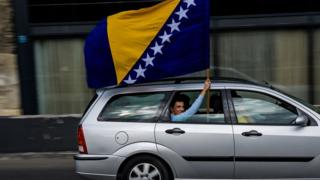 Image copyright
AFP
Image copyright
AFP
Polls are due to open in Bosnia-Herzegovina following an election campaign that observers say remains entrenched along ethnic lines.
A total of five presidents and 14 prime ministers must be elected in the country's complex system of government.
Tensions between Bosniaks (Muslims), Serbs and Croats have persisted since the 1992-95 bloody civil war.
Bosnia is still split into two entities - the Serb Republic (Republika Srpska) and the Muslim-Croat Federation.
The country's three-member collective presidency - Croat, Bosnian Muslim and Serb - was established as part of the US-brokered 1995 Dayton peace deal that ended the war in which in 100,000 died.
BBC Balkans correspondent Guy De Launey says that with high unemployment, Bosnia desperately needs fresh thinking from its leaders but remains split along ethnic lines.
Sunday's election will see voting for the central government - two chambers of parliament and the tripartite presidency - plus governments for the two separate entities.
In Republika Srpska voters will elect MPs, a president and two vice-presidents. In the Muslim-Croat Federation a bicameral parliament will be elected that includes a president and two vice presidents.
In addition, voters must cast ballots for assemblies that run the federation's 10 cantons. In all, nearly 7,500 candidates are running for 518 offices across the country.
Election monitors have complained that campaigning has been marked by ethnic leaders using divisive rhetoric harking back to the war.
Ethnic leaders use fear to divide
Analysis by Guy De Launey, BBC News, Belgrade
One in five people are unemployed and almost half the country's young people can't find a job. Those who are in work earn an average of around €400 (£350; $460) a month.
Many people have lost hope that the country can offer them a future. Almost 200,000 have left to work abroad in the past five years - 5% of the population.
But Bosnia's politics remain firmly based on ethnic leaders using fear to divide, rule and profit and this election will be no different. The EU announced a grand plan for reforms three years ago, but there's been little progress.
There will be some interest in the country's presidency, which has one seat for each of Bosnia's three main ethnic groups. The moderate incumbent Serb representative, Mladen Ivanic, is facing a challenge from the separatist Milorad Dodik.
And one of the few politicians who can claim to represent every ethnic group is running for the Croat seat. Zeljko Komsic has a Serb father, a Croat mother and is married to a Bosniak.
Whatever the results, it's not clear that a new government could actually be formed. The Constitutional Court invalidated parts of the electoral law two years ago, and parliament has failed to revise it.